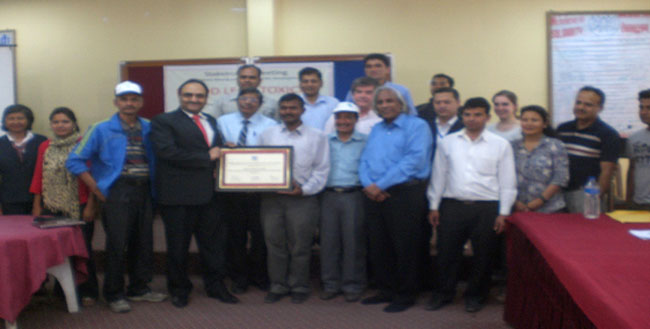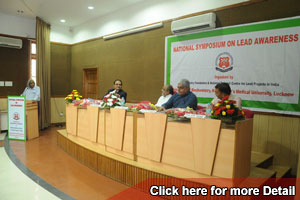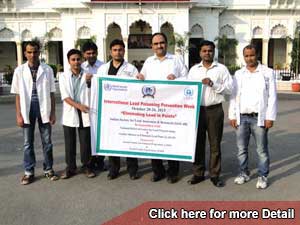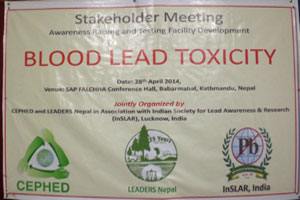
Report on
Stakeholder Meeting
Awareness Raising and Testing Facility Development Blood Lead Toxicity
Venue: Sap Falcha Hall, Kathmandu, Nepal Date: April 28, 2014, Monday
Jointly organized By
Center for Public Health and Environmental Development (CEPHED) Leaders Nepal
In Association with
Indian Society for Lead Awareness and Research (InSLAR), Lucknow, India
Stakeholder Meeting
Awareness Raising and Testing Facility Development Blood Lead Toxicity
- Introduction: Lead is a heavy, soft, gray-blue metal present in a large variety of products. Lead is one of the most ubiquitous toxic materials encountered in everyday life. In the past lead has been used as an anti-knock, lubricating additive in gasoline and as a pigment in paints. Lead is still commonly found in older pipes, brass faucets, or pipes with soldered fittings. Lead is also found in automotive batteries, fishing weights, and has long been the preferred material for use in shot and bullets.
- Objective of the program: The main objective of the program was to inform about the lead in paint and lead in blood issues in Nepal, to discuss on sources of Lead Exposure, Problem ad Perspective of Lead in Blood, to discuss about the national and international practices of BLL abatements and to identify the need and feasibility of setting BLL facilities and Lead Referral Center in Nepal.
- Awareness Raising about Lead Toxicity
- Feasibility and Operational Mechanism setting for Lead Referral Center in Nepal
- Establishment of Lead Referral Center and Lead Clinic in Nepal
- Program Overview: High level officials from Government, Indian scientists, Organizations, NGO, Painter’s Association, Public Forum, etc. were present in the program. The inaugural session was conducted by Mr. Manish Thapa with welcome speech and brief introduction of program and participants.
Technical Session:
At first Ram Charitra Sah, Executive Director, CEPHED addressed the issues related to lead in daily use products. He provided brief insight on the basis of results and findings CEPHED recently conducted.
a. Lead in Paint (Different batch study)
b. Lead in cosmetics
c. Lead in children toys
d. Lead in Jewelries and Lead in Household Dust


Certificate of Appreciation
Presentation was followed by round of appreciation. CEPHED was appreciated by InSLAR for their contribution on creating lead free society and further opening door for the collaboration in near future for BLL testing lab facility establishment. Prof. Thuppil Venkatesh set up an scenario of appreciation that bring positive changes with citing a very beautiful story of a children and his father appreciating each other though putting a ribbon as symbolic representation of appreciation. A formal appreciation session with remarkable key note speech from Prof. Venkatesh was delivered followed by handover of token of appreciation to CEPHED.
Terrence Thompson, Senior Environment Advisor, WHO for Nepal
He initiated his speech by mentioning about involvement of WHO in lead poisoning week which was successfully organized in Oct. 22-27, 2013. He started his speech with statement “No level of lead is safe.” Even a small amount of lead exposure can lead to health hazard such as impact on nervous system, child brain development, respiratory system, etc. He briefly talked about the lead in petrol or gasoline issues which was once a heated issue as lead in paint is of now. In that particular context, Nepal was successful to remove leaded petrol from country. By taking example of successful elimination of leaded petrol from country, he wishes for the same to lead in paint and other daily consumed products as well. According to him, currently WHO is getting increased engagement in this issue and is working closely with Ministry of Science, Technology and Environment (MOSTE) and Ministry of Health and Population (MOHP), Government of Nepal.

Prof. Abbas Ali Mahdi, President, Indian Society for Lead Awareness and Research (IsSLAR)
He presented on topic “Lead Toxicity: Our Experiences”. During his presentation, he presented several key topics such as:
- Definition of Lead and its potential sources.
- Potential route and source of lead exposure such as occupational and environmental source.
- Health impact of lead exposure.
- Prone areas/population of lead exposure such as children and pregnant women.
- Some important examples and cases of lead exposure: Test of Blood Lead Level in few children and adults and their findings.

Prof. N. Shasidhara, General Secretary, InSLAR
Prof. Shasidhara immediately started from where Prof. Abbas ended his presentation. With the help of examples provided by Prof. Abbas, Prof. Shasidhara provided the ongoing approach of awareness campaign. Some specific targeted awareness campaign or programs were launched by InSLAR are as follows:
SMILE: Seminar and Methods in Lead Education
QPEC: Quality Play Environment for Children and
STEP: Student Talent Exploration Project

Outcome of Program
There was round of discussion among participants about the need of blood testing lab in Nepal in current scenario and different perspectives that might arise in coming days. Several queries regarding the lead toxicity were made by participants to International experts especially from Ayurvedic perspective since people are using ayurvedic medicine without knowing its side effects on human health. After having discussion on lead toxicity issues, participants discussed the below mentioned topic which is also the key motive of the program. So program was successful in raising awareness about lead toxicity and set up the good ground to initiate further collaboration and cooperation with InSLAR towards setting for BLL Center in Nepal and other possible joint initiatives for lead toxicity abatement. This program has been mutually beneficial for Nepalese organizations (CEPHED, LEADERS Nepal), other government, non government, media, consumers and scientist group in Nepal as well as InSLAR towards expanding its network in neighboring countries.
Acknowledgement:
CEPHED and LEADER Nepal on our personal and institutional behalf as well as on the behalf of all children of Nepal highly acknowledges the support, help and coordination we have received from InSLAR. We highly acknowledge Prof. Thuppil Venkatesh, Prof. Abbas Ali Mahdi and Prof. N. Shashidhara for their kind support and extending helping hands as well as networking for our lead toxicity abatement campaign in Nepal
Name of the participant is list in the following table
| S No | Name | Designation | Email Id | Contact |
|---|---|---|---|---|
| 1 | Ram Adhar Sah | Ministry of Industry | Sahnbsm@gmail.com | 9851046934 |
| 2 | Radha Raman Prasad | Former DG, DDA | Radharaman.pd@gmail.com | 9851011403 |
| 3 | Dr. Pradeep K.C. | MOHP | kcdrpradeep@gmail.com | 9851147478 |
| 4 | Prof. A. A. Mahdi | President, InSLAR | mahdiaa@rediffmail.com | +91-9839011192 |
| 5 | Dr. T. Venkatesh | National Chairman, InSLAR | Venkatesh.thuppil@gmail.com | +91-9986837807 |
| 6 | Prof. N. Shashidhara | General Secretary, InSLAR | n.shasidhara@gmail.com | +91-9448543457 |
| 7 | Terrence Thompson | Sr. Environment Health Advisor, WHO | thompsont@searo.who.int | 9801010038 |
| 8 | Kanti Shrestha | Chief Scientific Officer, NAST | Kantishrestha2006@gmail.com | 9841554587 |
| 9 | Dhiraj Pokhrel | Leaders Nepal | leaders@wlink.com.np | 9841246263 |
| 10 | Dr. Manju Ulak | CHRP, Bhaktapur | manjeshwori@gmail.com | 9841220398 |
| 11 | Camille Ezran | Volunteer, Siddhi Memorial | Camille_ezran@yahoo.com | |
| 12 | Nar Bahadur Sunuwar | Camera Person, CWIN | 9849707631 | |
| 13 | Nawaraj Thapa | Consumer Right Investigation Forum | Dudenawaraj7@gmail.com | 9841519971 |
| 14 | Madhav Timalsina | President, CRIF | crinvestigationforum@gmail.com | 9841078209 |
| 15 | Manohari Siwakoti | CUPPEC, General | Siwakoti_manohari@yahoo.com | 9841542312 |
| 16 | Radha Kharel | BWI-NAC | Eyem_radha@yahoo.com bwinac@gmail.com | 9841806723 |
| 17 | Sitaram Joshi | AERSSC | ozone@ntc.net.np | 9849254784 |
| 18 | Krishna Gautam | National News Agency | Krishnagautam7@gmail.com | 9841609329 |
| 19 | Parbati Dhakal | National News Agency | parbati@gmail.com | 9849912529 |
| 20 | Puna Bhaila | CEPHED | Bhailapuna10@gmail.com | 9841619687 |
| 21 | Bishwo Regmi | Arthik Abhiyan Daily | Bishworegmi51@gmail.com | 9841612491 |
| 22 | Kunj Joshi | NHEICC, Teku | Kjm268@yahoo.com | 9841392794 |
| 23 | Chandra Mani Bhattarai | Program, Media | 9851117022 | |
| 24 | Ram Charitra Sah | CEPHED | Cephed04@yahoo.com | 9803047621 |
| 25 | Manish Thapa | Program Officer | Gambhir2046@gmail.com | 9843141850 |
| 26 | Raju Shrestha | KMC (Hamro Kathmandu) | Manshrestha66@yahoo.com | 9841448457 |
| 27 | Bishnu Khadka | F.S. | 9841664237 |




